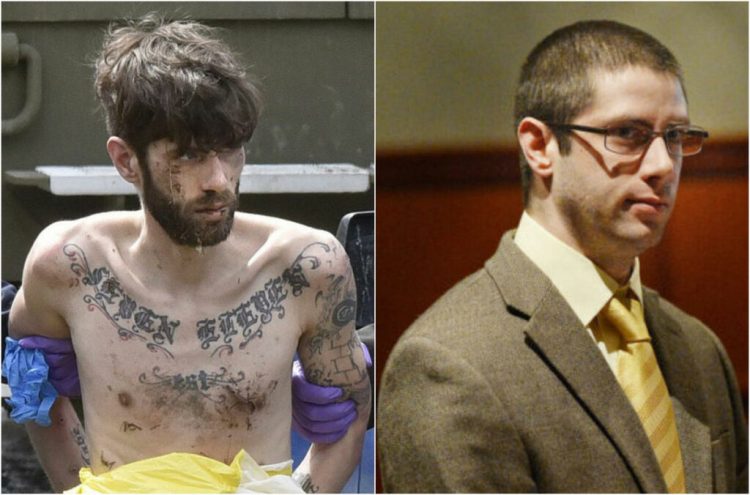One by one, men and women entered the conference room at the Cumberland County Courthouse on Tuesday.
John D. Williams sat at one end of the table and Superior Court Justice Robert Mullen sat at the other.
The judge led the questioning. Attorneys and court clerks scribbled notes. Williams remained silent. Each person was asked what they knew or believed about Williams and the Somerset County Sheriff’s deputy he is accused of killing, Cpl. Eugene Cole. Some answered directly. Others hesitated.
In the end, 12 jurors and three alternates were chosen Tuesday to hear the evidence at a trial scheduled to start Monday, and ultimately decide whether Williams is guilty of murder in Cole’s slaying. Of the 15 people selected, seven are men and eight are women.
Williams, now 30, of Madison, has pleaded not guilty, and his defense attorney last week said he will ask the jurors to consider a lesser charge of manslaughter because Williams was intoxicated and using drugs at the time of the shooting.
Cole, 61, was on duty as a Somerset County sheriff’s deputy when he was shot and killed in Norridgewock in April 2018.
He was the first Maine police officer fatally shot in the line of duty in three decades. Police launched a massive search and arrested Williams outside a secluded cabin in Fairfield nearly four days later.

Cpl. Eugene Cole
The case will be tried in Cumberland County instead of central Maine, but legal experts predicted that intense statewide media coverage of the case over the last year would still make finding a fair and impartial jury a challenge. The court had set aside a week for jury selection and was prepared to call in more potential jurors, if needed.
That process began Monday and took nearly two days. The court ultimately selected the 12 jurors and three alternates from more than 230 Cumberland County residents who received jury duty notices.
That pool filled out lengthy written questionnaires about their prior knowledge of the case, their connections to law enforcement, their ability to be objective and their experiences with guns and drug withdrawal.
Dozens of potential jurors, who were identified only by numbers, then went into the nearby conference room for their individual interviews, called “voir dire.” For most people, the judge and attorneys wanted to know whether the jurors who knew about the case from news reports or discussions with other people had already formed opinions about the case.
One young man said he remembered seeing a morning news report about the manhunt on TV once. He told the judge he could shut that report out of his mind and decide the case based only on the evidence presented in the courtroom.
But defense attorney Verne Paradie returned to that question at the end of the exchange.
“I just want to be clear because you seemed to pause a little bit on the question about whether you formed an opinion,” Paradie said. “No one is judging you or criticizing you if you have because it’s human nature, but it’s important for you to tell us if you have formed any type of opinion about the case as to whether someone is guilty.”
“Oh, OK, yeah, I think he’s guilty,” the man said. “I think it was a terrible thing that happened. I honestly don’t watch the news for that long of time. I heard it while I sat down eating cereal, and I just left for work.”
The parties thanked him for his honesty and sent him home.
Another man said he knew about the case from TV reports and social media. The judge asked him whether he had formed an opinion about the case from those stories, and the man said he did not think so.
“Let me ask you this,” Mullen said. “If you were on trial for some type of criminal offense, and there were jurors that have the same mindset that you do, would you want them on the jury?”
“I would say no,” he answered.
When the door closed behind that man, the attorneys and judge agreed to also remove him from the jury pool.
The interviews also covered personal connections to law enforcement, experience with drug withdrawal, training with guns and other topics.
One woman said she would have a moral objection to imposing the death penalty, and the judge told her Maine no longer uses capital punishment.
“You’ll also be instructed that you cannot consider the consequences of your verdict,” Assistant Attorney General Lisa Marchese asked one woman. “Can you do that?”
She paused.
“Yes,” she said. “Well, I’m not sure. How can you not think about that?”
When she left the room, Marchese asked for her to be eliminated, and the judge agreed.
The pool got smaller as the questions continued. The attorneys also were allowed to strike 11 jurors each without stating a reason. On Tuesday afternoon, the clerk read out the numbers of the people who will sit in the jury box at trial next week.
“Is the jury acceptable to the state?” Mullen asked.
“Yes, your honor,” Marchese said.
“To the defense?”
“Yes, your honor,” Paradie said.
The judge instructed the new jury members to not speak about the case or do independent research. He thanked the people who were not selected and dismissed everyone from the courtroom. Once the judge was gone, the next person to leave was Williams, escorted by a jail guard and not looking at the many faces that watched him go.
The trial will begin Monday and could last up to two weeks.
Comments are not available on this story.
Send questions/comments to the editors.



